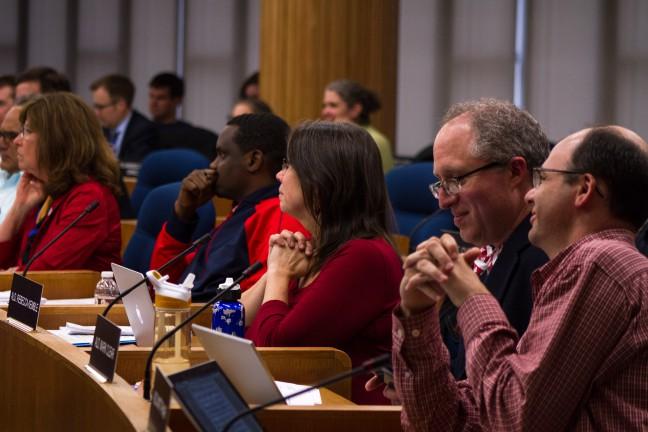Current regulations allow lobbyists to serve and even chair committees in Madison, and conflicts of interests are addressed by lobbyists themselves unless a complaint is filed. But, a proposal by Ald. David Ahrens, District 15, would stop much of this.
Ahrens’ proposal would prevent lobbyists who serve on committees from being able to vote.
Ahrens said current lobbyist regulations are lax and the city is more open to lobbyists in comparison to the state level. He said he was surprised the city hadn’t acted sooner given that some lobbyists chair the same committees that they’re paid to influence.
“This is not good government,” Ahrens said.
But Susan Schmitz, a lobbyist at Downtown Madison Incorporated, said the proposed rules would be prohibitive to many lobbyists who provide critical expertise in their fields.
Schmitz said current lobbyists often recuse themselves from committee decisions when there is a potential conflict of interest. She said the complexity of the issues many of these committees deal with is another reason allowing lobbyists should be allowed to serve.
Ahrens said there would still be a host of opportunities for lobbyists to sway committees and make their voices heard. For example, he said lobbyists would still be able to attend and observe committee meetings and give suggestions.
This would still allow the city to benefit from the knowledge and experience offered by many lobbyists, Ahrens said.
Schmitz also noted committee members are appointed by the mayor who can decide whether a lobbyist might have too many conflicts of interest.
“It seems like this is a fix looking for a problem,” Schmitz said.
The broad definition of a lobbyist by the city of Madison means that currently there are hundreds of registered lobbyists, Schmitz said. She said most people who speak before committees are lobbyists and those who have something to bring to the table wouldn’t be able to serve on a committee until they retire.
Ald. Mike Verveer, District 4, said he finds himself on the fence regarding the discussion and purposely didn’t cosponsor the bill because of how broad it is. Anyone registered as a lobbyist is affected by it, he said.
Verveer used the example of the Alcohol Licensing Review Committee whose newly appointed chair, Tom Landgraff, is a registered lobbyist because he has a client who’s trying to build senior housing. He said the proposal would mean Landgraff would have to choose between the committee and his client.
Verveer said the city needs Landgraff on the ALRC and that his experience is invaluable.
“I’m hoping for a compromise that won’t tar and feather every lobbyist,” Verveer said.
Verveer has worked on previous lobbying regulations and said he has personal interest in finding a workable solution.
Verveer and Schmitz both said the proposal has a chance at passing in one form or another. The proposal has yet to receive any action at City Council.












